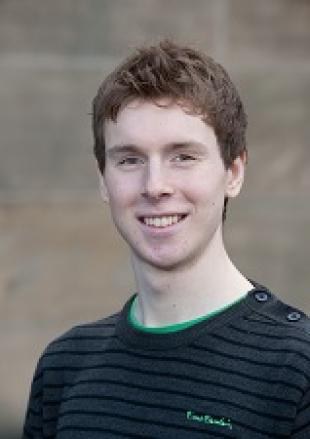EngD Thesis title: Experimental and Numerical Assessment of a Tidal Turbine Control Strategy
Company/Organisation: Tidal Energy Ltd.
Industrial supervisor: Mr Pete Bromley
Academic supervisors: Mr David Clelland (University of Strathclyde), Dr Aristides Kiprakis (University of Edinburgh), Dr Mohammad Abusara (University of Exeter)
Programme start: September 2012
Industrial Project start: June 2013
Educational background
I graduated in June 2011 with a Physics BSc from the University of Glasgow.
What were you doing prior to this programme?
I was on a gap year during which I spent a bit of time travelling and working. Firstly, I worked for the International Atomic Energy Agency (IAEA) in Vienna, and then I got my first taste of the offshore renewable energy industry while working for an environmental consultancy, called Aquatera, in Orkney.
What attracted you to studying with IDCORE?
The idea of doing doctoral research with a sponsoring company really attracted me. I don’t think I was that interested in doing a traditional PhD. Also, I thought the way in which the IDCORE programme is structured was appealing. I was happy to spend the first year doing taught modules rather than going straight into the research phase.
What attracted you to offshore renewables industry?/ What aspects of the industry do you find most inspiring, interesting or important for the future?
I was attracted by the opportunity to get involved in a young and exciting industry that is trying to address some of the major global issues. It is also an industry where research is needed in a number of different areas. I am personally quite interested in the methods that developers are using to make their devices more survivable and autonomous. This is something that is incredibly challenging given the fact that these devices tend to operate in some of the harshest environments.
Main responsibilities and challenges as a Research Engineer
For my project, I was largely responsible for handling and understanding the data that came off the numerous instruments on Tidal Energy Ltd.’s tidal turbine, known as DeltaStream. This information was then be used to verify and enhance mathematical models of the turbine. The challenge for me was to design a predictive control system that uses the data from the instruments for load mitigation during high and turbulent flow conditions.
Experience with IDCORE
The first year of taught modules in Edinburgh prepared me well for my research project. At times it did require quite a lot of hard work and commitment, but many of the skills gained during this period were higely useful for my research. Based with Tidal Energy Ltd., the company made me feel very welcome and I felt more like an employee than a student.
Do you have any other comments, interesting facts or stories to share?
Most IDCORE students have had at least one particularly late night in the Edinburgh office to meet a course deadline. My personal best is around 6 a.m., by which time the sun was out. This was just as well because I didn’t have any lights on my bike for the ride home!







